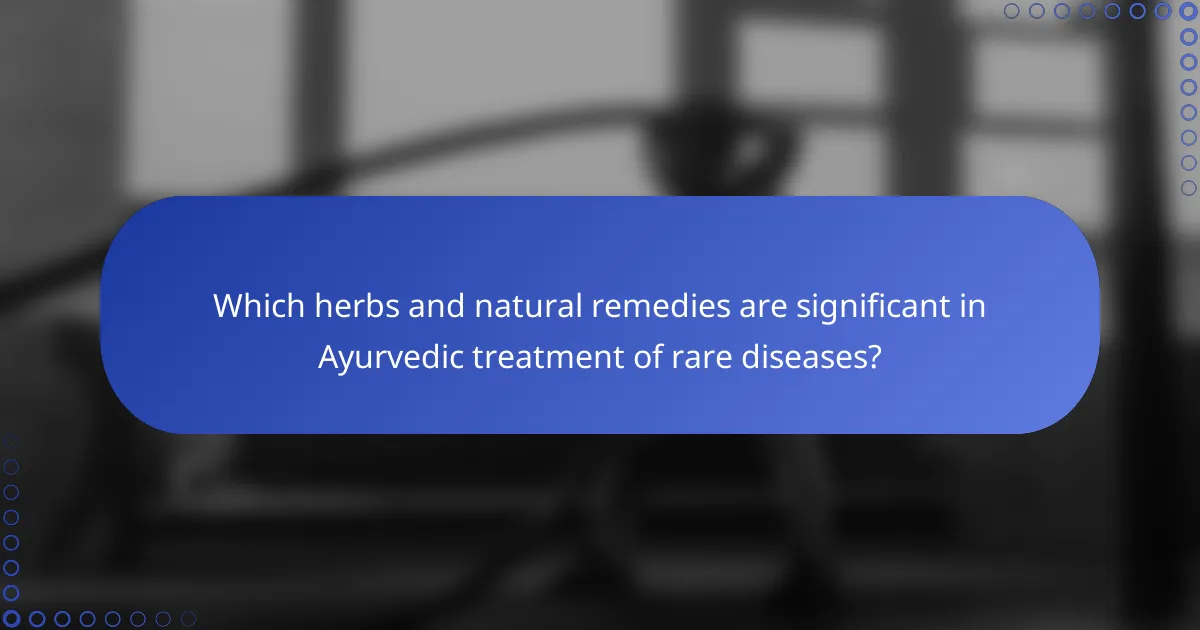Ayurveda offers a holistic approach to managing rare diseases, focusing on individualized treatment and natural remedies. Key principles include balancing body, mind, and spirit, along with lifestyle modifications. The article explores the benefits of personalized therapies, notable herbs, and the integration of Ayurveda with conventional medicine to enhance overall wellness. Additionally, it highlights recent research trends and case studies demonstrating Ayurveda’s effectiveness in treating rare conditions.

What are the core principles of Ayurveda in relation to rare diseases?
Ayurveda emphasizes holistic approaches to treat rare diseases by balancing body, mind, and spirit. Core principles include individualized treatment, herbal remedies, and lifestyle modifications. Ayurveda recognizes the unique constitution of each patient, tailoring therapies accordingly. Treatment often involves rare herbs and practices that may not be widely known, enhancing the overall healing process. Additionally, Ayurveda promotes preventive care, focusing on maintaining health to avoid disease onset.
How does Ayurveda define health and disease?
Ayurveda defines health as a balanced state of body, mind, and spirit, while disease arises from imbalances in these areas. Ayurveda emphasizes holistic approaches to treat rare diseases by addressing root causes and restoring balance. Principles include individualized treatments, herbal remedies, and lifestyle modifications. Benefits encompass improved well-being, enhanced immunity, and symptom management. Treatment approaches often involve dietary changes, detoxification, and therapeutic practices like yoga and meditation.
Which fundamental concepts underpin Ayurvedic practices?
Ayurvedic practices are underpinned by concepts such as balance, holistic healing, and individual constitution. These principles emphasize the interconnectedness of mind, body, and spirit. Ayurveda recognizes three primary doshas: Vata, Pitta, and Kapha, which represent different energy types. Each individual has a unique dosha balance that influences their health and treatment approaches. Additionally, Ayurveda incorporates natural remedies, dietary guidelines, and lifestyle adjustments tailored to the individual’s needs, promoting overall well-being and disease prevention.

What are the potential benefits of Ayurveda for individuals with rare diseases?
Ayurveda offers various potential benefits for individuals with rare diseases, focusing on holistic healing. It emphasizes personalized treatment approaches that address the unique attributes of each patient.
Ayurvedic principles aim to balance the body, mind, and spirit, promoting overall wellness. This can lead to improved quality of life and symptom management for those with rare conditions. For example, herbal remedies and dietary adjustments can support the immune system and reduce inflammation.
Furthermore, Ayurveda often incorporates lifestyle modifications, such as yoga and meditation, which enhance mental clarity and emotional stability. These practices can be particularly beneficial for managing the stress associated with rare diseases.
Finally, Ayurveda’s emphasis on preventive care encourages individuals to adopt healthier habits, potentially reducing the severity of symptoms and improving resilience against disease progression.
How can Ayurveda enhance overall well-being in patients?
Ayurveda can significantly enhance overall well-being in patients by promoting balance and harmony in the body. This ancient system emphasizes personalized treatment approaches, addressing the root causes of health issues rather than just symptoms.
Ayurveda’s holistic principles include the use of herbal remedies, dietary adjustments, and lifestyle modifications tailored to individual needs. For rare diseases, Ayurveda offers unique benefits such as improving immune function, reducing inflammation, and enhancing mental clarity.
Treatment approaches often involve detoxification processes like Panchakarma, which can restore vitality and support the body’s natural healing mechanisms. As a result, patients may experience improved quality of life and better management of their conditions.
What role does Ayurveda play in managing symptoms of rare diseases?
Ayurveda plays a significant role in managing symptoms of rare diseases through personalized treatment approaches. It focuses on balancing the body’s energies, or doshas, to enhance overall health.
Ayurvedic principles emphasize natural remedies, dietary adjustments, and holistic practices. These methods can help alleviate symptoms and improve quality of life. For instance, herbal formulations may target specific symptoms associated with rare conditions.
Benefits of Ayurveda include reduced side effects compared to conventional treatments and a focus on the individual’s unique constitution. This personalized approach considers root causes rather than just symptoms, fostering long-term wellness.
Treatment modalities may involve a combination of herbal medicine, yoga, and meditation tailored to the individual’s needs. This comprehensive strategy aims to restore balance and promote healing in patients with rare diseases.

How does Ayurveda approach treatment for rare diseases?
Ayurveda approaches treatment for rare diseases by focusing on individualized care, balancing doshas, and utilizing natural remedies. This holistic system emphasizes understanding the unique constitution of each patient, enabling tailored therapies.
Ayurvedic treatment often includes herbal formulations, dietary adjustments, and lifestyle modifications. For example, specific herbs may target rare conditions by enhancing immune function or detoxifying the body. This personalized strategy fosters overall well-being.
The benefits of Ayurveda for rare diseases include fewer side effects compared to conventional treatments and a focus on root causes. By addressing underlying imbalances, Ayurveda aims to restore health and prevent recurrence.
In summary, Ayurveda’s unique attribute is its comprehensive, patient-centered approach, making it a valuable option for managing rare diseases effectively.
What are the common Ayurvedic treatment modalities used?
Ayurvedic treatment modalities for rare diseases include herbal remedies, dietary modifications, detoxification techniques, and lifestyle changes. These approaches aim to restore balance and promote healing.
1. Herbal Remedies: Use of specific plants and formulations tailored to individual needs.
2. Dietary Modifications: Emphasis on nutrition based on body constitution and disease type.
3. Detoxification Techniques: Practices like Panchakarma to eliminate toxins.
4. Lifestyle Changes: Recommendations for daily routines and mental wellness.
How are personalized treatment plans developed in Ayurveda?
Personalized treatment plans in Ayurveda are developed through a comprehensive assessment of the individual’s unique constitution, health history, and specific symptoms. Practitioners analyze the balance of doshas, or biological energies, to tailor therapies that may include herbal remedies, dietary adjustments, and lifestyle changes. This approach ensures that treatments address not only the rare disease but also the individual’s overall well-being, enhancing efficacy and promoting holistic healing.

Which herbs and natural remedies are significant in Ayurvedic treatment of rare diseases?
Ayurvedic treatment for rare diseases includes several significant herbs and natural remedies. Notable examples are Ashwagandha, which enhances immunity, and Turmeric, known for its anti-inflammatory properties. Other important herbs include Guduchi, which supports detoxification, and Brahmi, beneficial for cognitive function. These remedies often work synergistically to restore balance and promote overall health.
What are the most effective Ayurvedic herbs for specific rare conditions?
Ashwagandha, Brahmi, and Guduchi are among the most effective Ayurvedic herbs for specific rare conditions. Ashwagandha supports adrenal function and reduces stress, beneficial for rare fatigue syndromes. Brahmi enhances cognitive function, aiding in rare neurological disorders. Guduchi boosts immunity and detoxifies, useful for rare autoimmune conditions. Each herb offers unique properties that align with specific health needs, demonstrating Ayurveda’s holistic approach to rare diseases.
How do these herbs interact with conventional treatments?
Herbs can enhance conventional treatments but may also interact negatively. Understanding these interactions is crucial for safe and effective management of rare diseases.
Ayurvedic herbs often support immune function, reduce inflammation, and improve overall well-being. For example, turmeric may enhance the effects of anti-inflammatory medications, while ashwagandha can help manage stress during treatment. However, some herbs might interfere with medication metabolism, leading to reduced efficacy or increased side effects.
Consultation with healthcare professionals is essential before combining Ayurvedic herbs with conventional treatments. This ensures safety and maximizes therapeutic benefits.

How does Ayurveda integrate with conventional medicine for rare diseases?
Ayurveda integrates with conventional medicine for rare diseases by offering holistic treatment approaches that complement standard care. This integration emphasizes personalized therapies, dietary adjustments, and herbal remedies to enhance overall wellness.
Ayurveda focuses on balancing the body’s energies, known as doshas, which can improve patient outcomes. For instance, it may help manage symptoms and side effects of conventional treatments. By incorporating Ayurvedic practices, patients often experience enhanced quality of life and improved resilience against rare diseases.
Research indicates that combining Ayurveda with conventional medicine can lead to more comprehensive care. Studies show that patients utilizing both approaches report better symptom management and satisfaction with their treatment plans. This integrative model encourages collaboration between healthcare providers to ensure a well-rounded approach to rare diseases.
What are the best practices for combining Ayurvedic and conventional treatments?
Integrating Ayurvedic and conventional treatments can enhance patient outcomes. Best practices include personalized treatment plans, regular monitoring, and collaboration between healthcare providers.
1. Assess patient history and current medications to avoid interactions.
2. Develop a holistic treatment strategy that combines Ayurvedic principles with conventional therapies.
3. Ensure ongoing communication between Ayurvedic practitioners and conventional doctors.
4. Monitor patient progress and adjust treatments based on response and side effects.
Which challenges arise when integrating these approaches?
Integrating Ayurveda for rare diseases presents challenges such as limited research, varying practitioner expertise, and patient acceptance. These factors can hinder effective treatment implementation. Additionally, the complexity of rare diseases complicates individualized Ayurvedic approaches. Collaboration between conventional and Ayurvedic practitioners is essential for overcoming these barriers.

What unique case studies highlight Ayurvedic success in treating rare diseases?
Ayurveda has successfully treated rare diseases through personalized approaches and holistic methods. Case studies demonstrate its effectiveness in conditions like rare autoimmune disorders, where Ayurvedic treatments have shown significant symptom relief. For instance, a study on a rare skin condition highlighted the use of herbal formulations that improved skin health and reduced inflammation. Another case involved a patient with a rare metabolic disorder who benefited from dietary adjustments and herbal remedies, resulting in improved metabolic function. These examples illustrate Ayurveda’s unique attribute of tailoring treatments to individual needs, showcasing its potential in managing rare diseases.
Which patient stories exemplify the effectiveness of Ayurveda?
Patient stories highlight Ayurveda’s effectiveness in managing rare diseases through personalized treatment approaches. For instance, a case involved a patient with a rare autoimmune condition who experienced significant symptom relief after incorporating Ayurvedic herbs and dietary changes. Another story features a patient with a rare metabolic disorder who improved their quality of life through tailored Ayurvedic therapies, emphasizing the holistic nature of treatment. These examples illustrate Ayurveda’s potential to address complex health challenges by focusing on individual needs and promoting overall well-being.
What lessons can be learned from these case studies?
Ayurveda offers valuable lessons for treating rare diseases through holistic approaches. These case studies highlight the importance of individualized treatments, emphasizing patient-specific needs and responses.
Additionally, they showcase the effectiveness of natural remedies and lifestyle modifications in managing symptoms. Integrating dietary changes and herbal supplements can enhance overall well-being.
Furthermore, these cases illustrate the significance of preventive care and early intervention in rare disease management. By focusing on root causes, Ayurveda promotes long-term health benefits.
Finally, collaboration between traditional and modern medicine can lead to innovative treatment strategies, benefiting patients with rare diseases.

What are the current research trends regarding Ayurveda and rare diseases?
Current research trends indicate a growing interest in Ayurveda as a complementary approach for managing rare diseases. Researchers are exploring Ayurvedic principles, herbal formulations, and personalized treatment plans. These studies highlight the potential benefits of Ayurveda in enhancing quality of life and reducing symptoms in patients with rare conditions. Recent findings suggest that specific Ayurvedic herbs may possess unique attributes that contribute to their efficacy against certain rare diseases. Collaborative efforts between traditional practitioners and modern scientists are paving the way for integrated treatment methodologies.
Which studies are leading the way in validating Ayurvedic practices?
Recent studies validating Ayurvedic practices for rare diseases focus on personalized treatment approaches and holistic principles. Research highlights the efficacy of herbal formulations in managing symptoms and improving quality of life. Notable studies have demonstrated benefits in autoimmune conditions, rare metabolic disorders, and chronic inflammatory diseases. These findings support Ayurveda’s unique attribute of individualized therapies tailored to specific patient needs.
How is Ayurveda being received in the global medical community?
Ayurveda is increasingly recognized in the global medical community for its holistic approach to treating rare diseases. Practitioners appreciate its emphasis on individualized treatment plans that consider physical, emotional, and environmental factors. Research highlights Ayurveda’s potential in managing symptoms and improving quality of life for patients with conditions like autoimmune diseases and rare genetic disorders.
Studies show that Ayurvedic principles, such as detoxification and herbal remedies, can complement conventional treatments. This integrative approach is gaining traction among healthcare professionals seeking alternative methods to support patient care. As a result, Ayurveda is being integrated into some healthcare systems, reflecting a growing acceptance of traditional medicine in modern practices.
What future directions are being explored in Ayurvedic research?
Ayurvedic research is exploring personalized treatment approaches for rare diseases. This includes integrating traditional practices with modern scientific methods to enhance efficacy. Studies are focusing on the unique attributes of specific herbs and formulations, aiming to develop targeted therapies. Additionally, collaborative research is investigating the role of Ayurveda in managing complex conditions through holistic approaches, emphasizing prevention and overall wellness.
What practical tips can patients follow when considering Ayurveda for rare diseases?
Patients considering Ayurveda for rare diseases should focus on personalized treatment plans. Here are practical tips to follow:
1. Consult a qualified Ayurvedic practitioner for tailored advice.
2. Maintain a detailed health diary to track symptoms and responses.
3. Incorporate specific herbs known for their therapeutic properties.
4. Emphasize a balanced diet that aligns with Ayurvedic principles.
5. Engage in regular yoga and meditation to enhance overall well-being.
6. Stay informed about ongoing research in Ayurveda related to rare diseases.